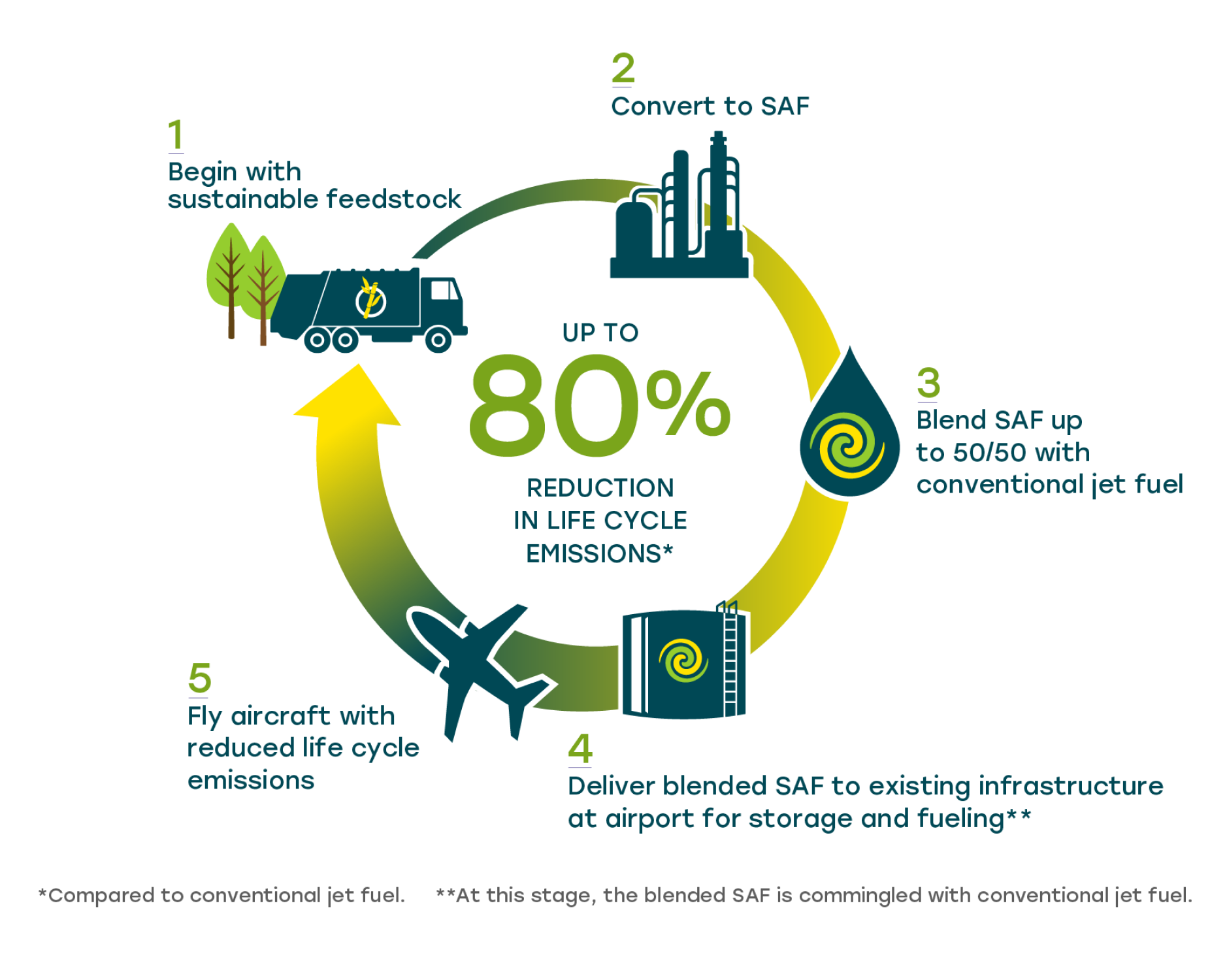Sustainable Aviation Fuel
As an island chain located in the middle of the Pacific, Hawaiʻi relies heavily on air transportation to connect our island communities and support the visitor industry and other aspects that drive our economy and sustain our way of life.
What is Sustainable Aviation Fuel?
Sustainable Aviation Fuel (SAF) is jet fuel made from sustainable feedstock instead of petroleum. SAF has a 50 to 80 percent lower lifecycle carbon intensity when compared with conventional jet fuel. SAF is considered a “drop in” fuel after it is blended with conventional jet fuel up to 50 percent. After blending, SAF is essentially indistinguishable from conventional jet fuel and it can be used in existing aircraft engines and airport fuel storage infrastructure.

SAF Infrastructure Investment
In April 2023, Par Pacific announced its plans to invest $90 million to develop the state’s largest liquid renewable fuels manufacturing facility at its Kapolei refinery with a targeted completion date in 2025. The project relies on the Kapolei refinery’s highly experienced operating team, existing tank storage and related logistics, as well as available hydrogen from current refining operations, a key requirement for low-carbon renewable fuels production.
The renewable fuel facility is expected to produce about 61 million gallons per year of renewable diesel, sustainable aviation fuel, renewable naphtha, and liquified petroleum gases. These renewable fuels lower greenhouse gas emissions while providing reliable electricity and transportation fuels for Hawaiʻi consumers.
The Science of SAF Production
Par Hawaiʻi will produce SAF from a well-established method referred to as hydro-processed esters and fatty acids (HEFA). In the HEFA process, a carbohydrate is converted to a hydrocarbon by removing the oxygen content in the renewable feedstock. This step uses hydrogen to remove the oxygen and produces water as a byproduct. The resulting hydrocarbon is then further processed to produce a fuel that has flow and other properties to make it suitable for aircraft or other engines. SAF has significantly lower carbon emissions compared to pure petroleum-based fuels.
A Partnership Between Par Hawaii and Hawaiian Airlines
In 2022, Par Pacific and Hawaiian Airlines, the largest air carrier in the state, announced a joint feasibility study to explore ways to make sustainable aviation fuel commercially viable. The announcement marked a significant milestone in the shared effort to produce renewable fuels in Hawaiʻi.
A Partnership Between Par Hawaiʻi and Hawaiian Airlines
In 2022, Par Pacific and Hawaiian Airlines, the largest air carrier in the state, announced a joint feasibility study to explore ways to make sustainable aviation fuel commercially viable. The announcement marked a significant milestone in the shared effort to produce renewable fuels in Hawaiʻi. In 2008, the Hawaiʻi Clean Energy Initiative set a target of 100% clean energy by 2045. In 2018, the Hawaiʻi State Legislature passed HB 2182 which set an ambitious policy for Hawaiʻi to be net zero in GHG emissions by 2045. Hawaiʻi became the first state in the nation to send a clear message to the world to secure their energy future and climate health. Additionally, Hawaiʻi, as part of the United States Climate Alliance, joined leaders from every other country on earth and committed to upholding the objectives of the 2015 Paris Agreement.
“SAF is an integral part of decarbonizing aviation, and we hope to be able to make joint investments in SAF production here in Hawaiʻi, which will benefit both the environment and our economy. We know that will take more than just our companies to accomplish this ambitious objective, and we look forward to engaging with partners across the community to build a more sustainable future for travel to, from and within the islands.”
— Peter Ingram, President and CEO of Hawaiian Airlines
A Partnership Between Par Hawaiʻi and Pono Pacifics
In May 2023, Par Hawaiʻi and Pono Pacific, Hawaiʻi’s largest private natural resource conservation company, announced their partnership to identify and develop local sources of vegetable and other plant-based oil to produce renewable diesel and sustainable aviation fuel (SAF) at the Kapolei refinery. This gives the state an additional major economic boost by creating a newmarket for locally grown oil seed crops.
“Pono Pacific’s commitment to supporting sustainable, local agriculture and stewardship of natural resources are important to us. Supplementing feedstocks processed at our reconfigured refinery with locally sourced oil crops will help to build Hawaiʻi energy resiliency. We look forward to continuing our efforts to diversify and decarbonize energy sources for our community.”
— Eric Wright, President of Par Hawaiʻi
“SAF made from biofuels can deliver the performance of petroleum-based jet fuel but with a fraction of its carbon footprint. Producing SAF locally will undoubtedly create jobs and revenue for rural communities, and result in a more sustainable economy for Hawaiʻi.”
— Chris Bennett, Vice President of Sustainable Energy Solutions for Pono Pacific
“With jet fuel accounting for more than 50 percent of Hawaiʻi’s transportation energy mix, I applaud Par and Pono Pacific for their bold commitment to locally produced SAF. We stand ready to support this and other similar lifecycle efforts with workforce training and technical assistance to build a clean energy economy in Hawaiʻi.”
— Mark Glick, Chief Energy Officer, Hawaiʻi State Energy Office